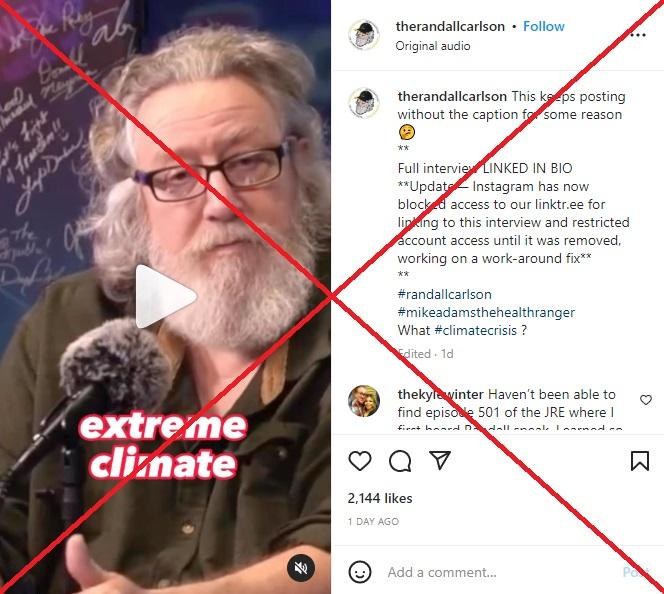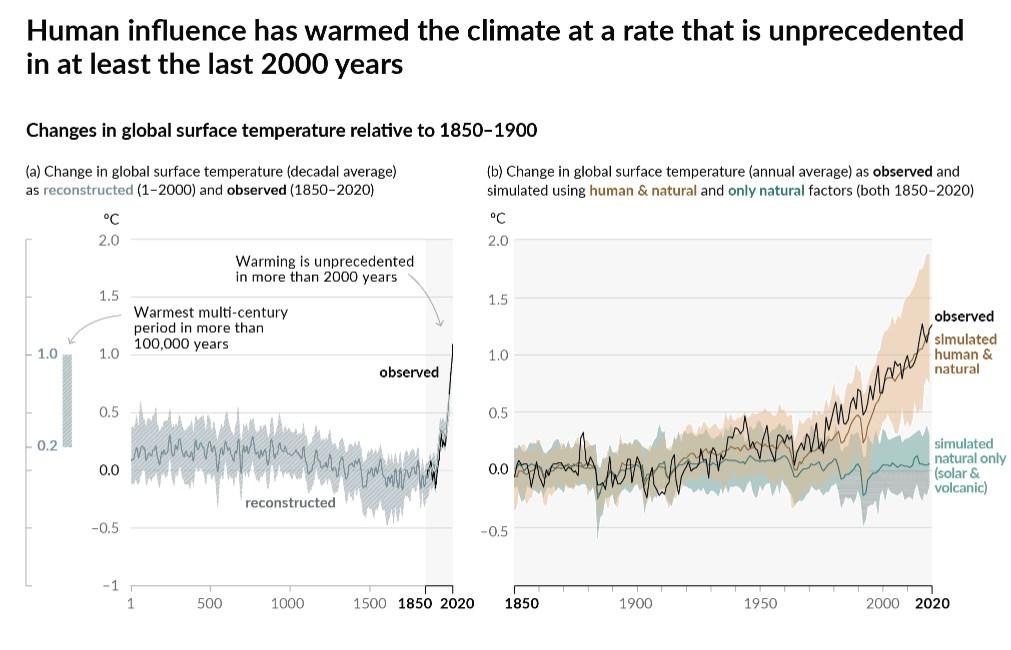
US podcaster promotes false claims about weather, climate change
- This article is more than two years old.
- Published on March 14, 2023 at 14:19
- 4 min read
- By Roland LLOYD PARRY, Manon JACOB, AFP USA
"What the evidence has overwhelmingly shown is that a lot of those events that we would think of as extreme climate or weather or meteorological events are actually declining in severity," says Randall Carlson, host of the "Kosmographia" podcast, in a video published March 11, 2023 on Instagram.
The footage comes from an interview on Mike Adams's "Health Ranger Report," a program hosted by online broadcaster Brighteon.TV. AFP has previously fact-checked both Carlson and Adams, founder of the website Natural News, for spreading misinformation.
"We can look at accumulated cyclonic energy, typhoons in the Pacific, hurricanes in the Atlantic, and it's actually declined over the last 20 or 30 years," Carlson says in the clip shared online. "We can look at forest fires, they've declined, we can look at droughts ... and when we look back let's say at the last millennium or two, periods of cold weather, by contrast, have been the ones where the greatest extremity and frequency of these intense events have occurred."

Carlson's website advertises speaking events on subjects such as "ancient technologies and esoteric principles." His Instagram post promoting the interview with Adams accumulated hundreds of likes.
But Carlson's claims are misleading -- AFP has previously fact-checked similar assertions about hurricanes and wildfires.
Hurricanes
The UN Intergovernmental Panel on Climate Change (IPCC) said in a 2021 report: "It is likely that the global proportion of Category 3–5 tropical cyclone (TC) instances has increased over the past four decades."
"The proportion of intense TCs, average peak TC wind speeds, and peak wind speeds of the most intense TCs will increase on the global scale with increasing global warming," the panel said.
The IPCC is the top global reference for assessing the state of knowledge on climate change. Hundreds of scientists review thousands of studies to contribute to the panel's reports.
Global warming intensifies the impact of hurricanes by raising the risk of storm surges and extreme rainfall due to rising sea levels and a warmer atmosphere.
"Most research has shown that climate change will likely increase the number of intense hurricanes," Karthik Balaguru, a Pacific Northwest National Laboratory climate scientist, told AFP in February 2023.
The United States had no major hurricanes making landfall from 2005 to 2017, but a study concluded that this was likely not an indication that they were becoming less frequent overall, with "no shortage of major hurricanes" beyond US shores. Balaguru said the period after 2017 saw "one of the most active years ever in terms of Atlantic hurricane activity."
Wildfires
AFP has previously debunked claims that wildfires have not worsened in recent years.
Studies show both the area burned and the severity of large forest fires in the western United States and Alaska have increased since the early 1980s. Scientists project that trend will continue as the regions warm.
"There is widespread evidence that fire severity in the western US is increasing, fires are getting larger and burning more area, and that climate change is a strong contributor to these trends," Phil Dennison, a vegetation and wildfire researcher at the University of Utah, told AFP in February 2023.
Droughts
Contrary to Carlson's claim, research shows climate change also aggravates droughts.
"Recent publications based on observational and modeling evidence suggest that human emissions have substantially increased the probability of drought years in the Mediterranean region," the IPCC said in its 2019 report.
In a March 2023 study published in the peer-reviewed journal Nature, scientists Matthew Rodell and Bailing Li said: "Total intensity of extreme events was strongly correlated with global mean temperature ... suggesting that continued warming of the planet will cause more frequent, more severe, longer and/or larger droughts."
Analyses from the World Weather Attribution group, a project involving scientists from several different countries, have indicated climate change made events such as the 2022 droughts in the northern hemisphere more likely.
Temperatures rising
Global data shows temperatures have fluctuated over the past two millennia, with a number of cold extremes. But since the 19th century, temperatures have risen faster than the average rate due to humans burning fossil fuels.
The IPCC sums up the trend in a chart at the start of its August 2021 report.
The left-hand side shows temperatures rising sharply over the past 150 years. On the right-hand side, a blue line shows how much lower global temperatures would be without humans releasing carbon dioxide and other greenhouse gases.

"It is unequivocal that human influence has warmed the atmosphere, ocean and land," the IPCC said in the report.
AFP has fact-checked other false and misleading claims about climate change here.
Copyright © AFP 2017-2026. Any commercial use of this content requires a subscription. Click here to find out more.
Is there content that you would like AFP to fact-check? Get in touch.
Contact us




